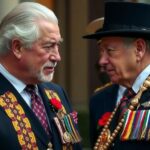Commonwealth Leaders Address Climate Change and Slavery Reparations at Summit
At the Commonwealth summit in Samoa, leaders addressed crucial issues such as climate change and slavery reparations. Emphasizing the threats of rising sea levels and climate crises, discussions included calls for reparations from Britain for its slave trade role, revealing ongoing tensions between historical accountability and future progress.
Leaders from Commonwealth nations convened on Thursday in Samoa, addressing issues of climate change and reparations for Britain’s involvement in transatlantic slavery. This gathering, led by King Charles, showcases 56 countries, predominantly with historical ties to the British Empire. The discussions are crucial, particularly for small nations facing significant threats from climate change, including rising sea levels.
During the summit, Maina Vakafua Talia, Tuvalu’s climate change minister, emphasized the urgency of adhering to the Paris Accord’s goal of limiting global warming. He described new fossil fuel ventures as detrimental, urging wealthier nations to cease expanding fossil fuel projects. The summit will also foreground a declaration focused on ocean protection amid these climate concerns.
Penny Wong, Australia’s Foreign Minister, highlighted climate change as the foremost national security and economic threat affecting Pacific peoples and Commonwealth nations, while Zambia expressed grave concerns regarding climate impacts on food security. Demonstrating the urgency of the issue, Antonio Guterres, UN Secretary-General, noted that Pacific Island ocean temperatures are rising disproportionately, rendering the local populations more vulnerable.
As discussions unfolded, the subject of reparations took a significant role, escalating calls, particularly from the Caribbean Community and the African Union. British Prime Minister Keir Starmer articulated a reluctance to discuss reparations directly at the summit, advocating for a forward-looking approach rather than revisiting historical grievances.
Critics like Eric Phillips, from CARICOM, questioned the Commonwealth’s relevance amid such dismissive attitudes toward reparations. Meanwhile, there were reports of indirect discussions regarding reparations ongoing during the summit. Frederick Mitchell, Foreign Minister for the Bahamas, suggested that the summit draft includes calls for reparations discussions, signifying a desire among CARICOM countries for dialogue.
The reparations debate is contentious, with proponents arguing for recognition of the enduring racial inequalities stemming from slavery and detractors insisting on the inappropriateness of implicating modern nations in historical injustices. Throughout history, millions of Africans were subjected to the horrors of slavery, and the enduring socio-economic ramifications continue to resonate today.
The Commonwealth summit in Samoa prominently featured discussions on climate change and slavery reparations. With leaders recognizing the pressing need for collaborative climate action, the urgency for reparations also surfaced, reflecting a broader global dialogue. The divide between engagements on historical injustices and a forward-looking approach underscores the complexity of these issues, as nations seek resolutions that honor both heritage and future equity.
Original Source: www.nbcnews.com








Post Comment